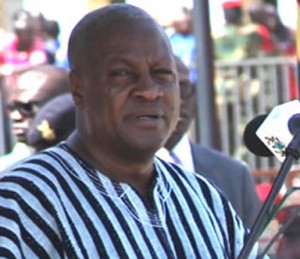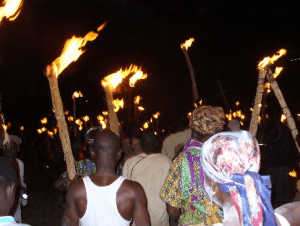Mediating the Dagbon crisis: Employ Gbewa family formula to patch cracks in the wall

The most imaginative highlight of this year’s Damba festival in Yendi the traditional capital of Dagbon is certainly President John Dramani Mahama’s installation as Zaa Maligu Na, fairly translated as General Chief Mediator or facilitator of negotiation.
His installation signifies simply that the people in the area are in need of such related professional services.
Appropriately President Mahama conveyed to his host Regent Kampakuyana Abdulai Yakubu, a noteworthy and memorable announcement of Otumfuo Osei Tutu II the Asantehene’s third-party mediation Committee’s resumption in the horizon even as the president dances Damba away in nostalgia.
Generally this should be welcome news indeed, coming from the easy-going and interconnecting 4th John at the presidency succeeding Rawlings, Kuffuor and Mills in that order. It is worth recalling that this trained communicator is reported to have excelled while growing up among his peers celebrating one Damba after another which remains very meaningful to the lives of his peoples of Northern Ghana.
From Kofi Annan’s United Nations to date this global organization supported the Otumfuo’s “now on and now off” committee for a decade through the UNDP’s Governance programme. There may be some success stories in there and yet a more palpable breakthrough is yet to unfold. It does appear that the Dagbon chieftaincy crisis may be no longer smoldering on the surface, but all the same it still presents itself as intractable to Ghanaians, scholars and practitioners of alternative dispute resolution commonly referred to as ADR.
The real time riposte and suggestion to apply the Gbewa family formula, valiantly expressed by the Regent of Tolon, Major (rtd) Suleimana Abubakari well known as a decisive coup d’état stopper can only be weighted in gold because the time-tested prescription for sustainable peace has so far been sidestepped in favour of the Otumfuo Committee since the erratic eruption of viciousness and the murder of Ya Na Yakubu Andani ll in March 2002.
All along, quite a number of people in Dagbon including participants whispered their objection to the Manhyia long-winded method but were hardly heard by the go-betweens. Now with Mr. Emmanuel Bonbande until recently associated with the West African Network for Peace endorsing Major Suleimana’s position a change of direction may well be the next thing to be expected.
One may ask what the Gbewa family formula is. At the apex of this son-succeeding-father system is the unique Mamprussi King, the substantive Naa Bahigu Mahami Abdulai Sherigu who the cap fits properly being the natural leader of the Gbewa family.
From the 17 offspring of Na Gbewa the empire-builder-founder of the great Kingdom in circa 1400, prominent today would include what remains of the dynasties of Mamprussi established by Tohigu being the senior son, Dagbamba set up by Sitobu, the Nanumba founded by Nantambo a sensible youngster, the Mossi built by horse controlling daughter Yantaure, mother of Wedraogo and the Tongo divining leadership beyond the Bolgatanga stone hills among others.
The corporate thread that runs through this family is an in-built pacifying resolution based on consanguinity or blood relations where cousins on the man’s side and those of the woman’s side of the polygamous family are perpetually obliged to reach unhesitating understanding by appeasing each other. This arises out of institutionalizing the experience of the inevitability of conflict in society. To minimize dispute, cousins are on lighthearted and teasing terms but never abandoning each other and even in the confrontational nature of competition to attain glories or prizes whilst those who suffer must be pacified.
Inter-marriages may take place among distant and not so distant kinsfolks not only to cement relationships but also to maintain power and property within this dominant horse-riding ruling class.
Ironically it was the competitor celebration of the fire festival “Bugum” which resulted in the murder of the Ya Na and yet this ritual is designed by ancient wisdom to promote the carefreeness and happiness between grandchildren and their grandparents far and near; between maternal nephews and their uncles and between the Mossi people and other family members of the Gbewa family like Dagbambas, Mamprussis, Nanumbas and Walas because of the woman factor.
Among all these groups, the playmate or “dachahili” scheme is set up to defuse tension no matter the extent to which expensive anecdotes can go. Those playful but foul witticisms will remain not actionable in legal terms just like the unwholesome actions on April Fools’ Day.
If the use of tradition to resolve the conflict in Dagbon is worth the while then it is during the celebration of the fire festival that the Moro Naba of Ouagadougou could march or descend cheerfully on all Dagbambas to assert that they must collectively pay him his share of playmates’ symbolic coins or “zambelli” in Mossi language or “yaan lagfu” in Dagbangli irrespective of where they stand in the Yendi crisis because at the end of the day every Dagomba is a source of earnings for any Mossi citizen. The so-called Abudu and Andani will joyfully pay up for the Aunty’s or Grandmother’s people and still stay cheerful for further interaction.
History tells us that this Na Gbewa’s senior son, the Nayiri and the Chief’s grandfather in Gambaga would be the last resort and their age-old binding decisions would hold sway in times of dispute. Today the Gbewa family members ranging from those in far-away Ouagadougou, closer quarters in Yendi, not so far off in Bolga, sheltered in Bawku and uneasy in Bimbilla could only decline the use of the Nayiri’s good offices in pain of unkind circumstances.
A case in point in history where the Nayiri headed off disaster was when a relatively young Na Nyagsi was chosen over and above his older brothers who contested him and gave him a run for his money. The wiser Mamprussi King demanded that competitors coming to his palace should announce their names in proverbial terms. According to Drum History, Na Nyagsi’s wise-cracking proclamation was unrivaled and he became the undisputed Ya Na. He pointed at the silk tree’s hanging ovaries fruited same day like all the princes from different mothers, stood an equal chance of being chosen as a leader. Other princes made belligerent statements sounding warlike and the illustrious Mamprussi King discarded them as not useful for social engineering and or not the way to managing people.
With the benefit of hindsight today, we can say that being well-travelled and learned, Na Zangina’s achievements included the establishment of new integrated industries such as the weaving textile industry in Kpabiya and Yendi, now all over the place, the use of the Muslim calendar (alternative to the Western system), introduction of Muslim names, festivals bearing Dagbanli names such as Damba for Prophet Muhammad’s birth day, Chimsi for the Mecca pilgrimage time big Sala or Eid-ul-Adha, forms of circumcision and simple burial.
Beyond Dagbon there appears to be a ground swelling of conflict resolution experts in Ghana but so far the communal disputes dotted around the communities, in workplaces and within families in all the regions in the country ought not to be managed with high handedness as security issues per se. Rather the authorities should begin to complement security efforts with people skills, non-adversarial, relational and attitudinal transformation to be attended to by those who understand conflict as a social canker, employing PULSE or people using language skills effectively.
Their unique insights, skills and know-how may well come in handy to decongest the courts in non-criminal cases. Disagreeing neighbours need not live as enemies and so on. Mediators are better placed to be involved in preventive conflict resolution in areas like chieftaincy, guiding and managing peace building processes and promoting peace lessons associated with the upbringing of children whose language will only be peaceful and peaceable to pave the way for building sustainable peace in a new Ghana and a changing environment in West Africa. Early threatening language like “I will beat you!!!” in English, “me bu wo!!” in Twi or “ma yi bo!!!” in Ga, can be replaced with softer ways of expressions from childhood into adolescence and adulthood in Ghana and Africa’s communities with a brighter future.
By Iddrisu Siddiq
Email: [email protected]

